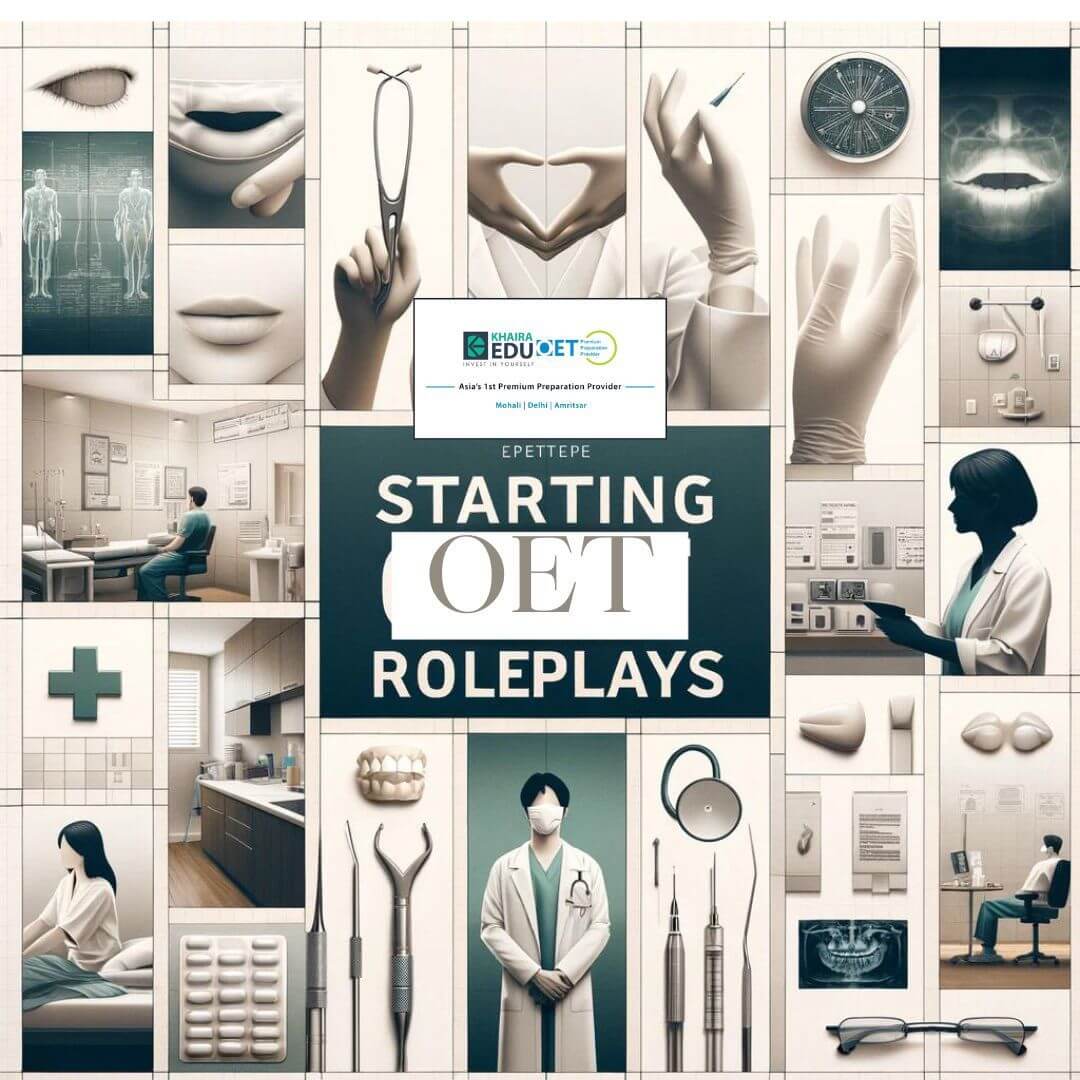At Khaira Education in Mohali, India, we understand that acing the OET Writing test involves the art of transforming medical case notes into formal referral letters. This not only involves selecting relevant information but also articulating it using the appropriate tenses and voices, ensuring the communication is precise and clear. This blog post delves into the essential skills of tense accuracy and voice selection, integral components of the OET writing sub-test.
Tense Accuracy in OET Writing:
Correctly conveying the timeline of the patient’s condition or treatment is paramount and hinges on the proper use of tenses.
Your ability to choose the correct tense can make a significant difference in the OET referral letters. Classes at Khaira Education emphasise this skill, ensuring that each student can accurately reflect a patient’s medical timeline.
Let’s understand this with an example:
Case Note: “Patient counseled on smoking cessation, May 2021.”
Now let’s see how incorrect tense usage can lead to confusion about patient’s care.
1.Present Continuous (Incorrect Tense)
•Incorrect: “The patient is currently being counseled to stop smoking since May 2021.”
•This suggests that the counseling is an ongoing process that started in May 2021 and is still happening, which may not be the case.
2.Present Perfect (Incorrect Tense)
•Incorrect: “The patient has been counseled to stop smoking since May 2021.”
This implies the counseling started in May 2021 and has continued up to the present, possibly leading the recipient to believe the patient still requires support.
3.Past Perfect (Incorrect Tense)
•Incorrect: “The patient had been counseled to stop smoking by May 2021.”
•This could be misunderstood to mean that the counseling was completed before May 2021, which may not align with the actual timeline.
4.Past Continuous (Incorrect Tense)
•Incorrect: “The patient was being counseled to stop smoking in May 2021.”
•This indicates that the counseling was an ongoing action specifically during the time of May 2021, which might confuse the recipient about whether the counseling was a single event or a series of sessions.
5.Simple Past (Correct Tense)
•Correct: “The patient was counseled on smoking cessation in May 2021.”
•This clearly communicates that the counseling occurred as a discrete event in the past, which accurately reflects the action without implying any continuation or repetition.
Incorrect tense usage can lead to significant confusion about the status of a patient’s care. For instance, in the example we read above, using the present continuous or present perfect tenses incorrectly suggests ongoing counseling, which may lead the recipient of the letter to question whether further interventions are necessary or if the patient is non-compliant. Conversely, the past perfect tense might suggest that the counseling is no longer relevant, potentially causing the recipient to overlook this aspect of the patient’s care history. The simple past tense conveys a clear, unambiguous message about the patient’s care, ensuring that the recipient has an accurate understanding of the patient’s medical history and current needs.
Let’s see more examples:
Case Note: “Diabetes management initiated 2018, insulin-dependent.”
Incorrect: “The patient was starting to manage diabetes in 2018 and was dependent on insulin.”
Correct: “The patient initiated diabetes management in 2018 and has been insulin-dependent since then.”
The incorrect example suggests an ongoing action (‘was starting’) which does not accurately reflect the completed action of initiating diabetes treatment. The correct sentence uses the past simple tense for the initial action and the present perfect to indicate the continuing state of insulin dependence.
•Case Note: “Appendectomy performed, 2019.”
•Incorrect: “The patient had got an appendectomy in 2019.”
•Correct: “The patient underwent an appendectomy in 2019.”
•” Had got” is a grammatically incorrect and unclear way to express the past action. “Underwent” is the correct past tense verb for this medical procedure
Voice Selection and Its Impact:
Khaira Education’s OET coaching in Mohali includes comprehensive OET training on when to use active or passive voice, focusing on effectively highlighting either the patient’s actions or the medical procedures they undergo.
Choosing between active and passive voice should align with the focus of the information being conveyed.
Let’s see an example below:
Case Note: “Recommend physiotherapy for post-stroke rehabilitation.”
Less suitable (Active): “I recommend the patient to undergo physiotherapy for post-stroke rehabilitation.”
More suitable (Passive): “Physiotherapy is recommended for the patient’s post-stroke rehabilitation.”
The active voice unnecessarily centers the healthcare provider with ‘I recommend,’ which is not the focus in this context. The passive sentence uses emphasises the recommended action for the patient’s benefit, making it a more suitable alternative being patient centred.
Let’s put this into practice
Case Note: “Appendectomy performed May 2021, uneventful recovery.”
See the above note and choose which of the following accurately transforms it.
“The patient had an appendectomy done last May and recovered without any events.”
“ The patient underwent an appendectomy in May 2021 and experienced an uneventful recovery.”
Answer: The second option is correct. ‘Had done’ is ambiguous and ‘without events’ is an incorrect phrase; ‘uneventful recovery’ is a standard term in medical communication. The second sentence clearly states both the time of surgery and the nature of recovery.
See another note and then choose which option coverts it correctly.
Case Note: “Patient to reduce weight, BMI 30.”
“The patient is needed to reduce weight, having a BMI of 30.”
“The patient has been advised to reduce weight due to a BMI of 30.”
Answer: The second sentence is correct. The first version awkwardly uses ‘is needed’ and presents ‘having’ out of context. The correct sentence properly uses the present perfect passive to indicate ongoing advice due to the patient’s current BMI.
Case Note: “Smoking cessation advised 2021.”
See the above case note and decide which of the following coverts it accurately.
•“The patient stopped smoking since 2021.”
•“The patient was advised to cease smoking in 2021.”
Answer: The second sentence is correct. The first sentence incorrectly suggests that the patient has already stopped smoking, while the correct sentence clearly states the advice given.
Practice Tips:
Time Matters: Match tenses with the timing of the patient’s medical events.
Subject-Action Alignment: Choose active or passive voice based on whether the subject or action should be emphasized.
Clarity is Crucial: Every sentence should convey its intended meaning unambiguously and succinctly.
Khaira Education’s commitment to excellence is reflected in the meticulous approach to OET training, where understanding the nuances of English usage is balanced with the demands of professional medical communication. Thus, Khaira Education does not just prepare candidates for a test; it prepares them for a future where their words can shape patient outcomes and build professional relationships Asia’s first Premium Preparation Provider, Khaira Education, empowers aspiring healthcare practitioners with expertly crafted OET lessons to navigate the OET successfully.



